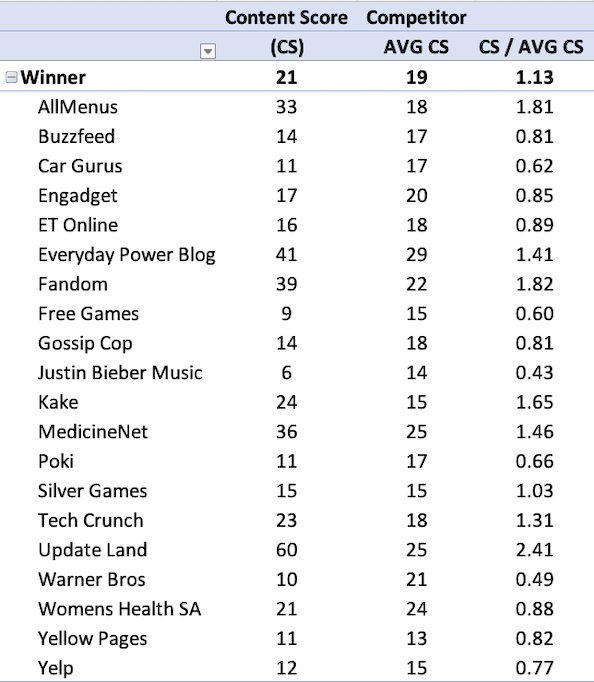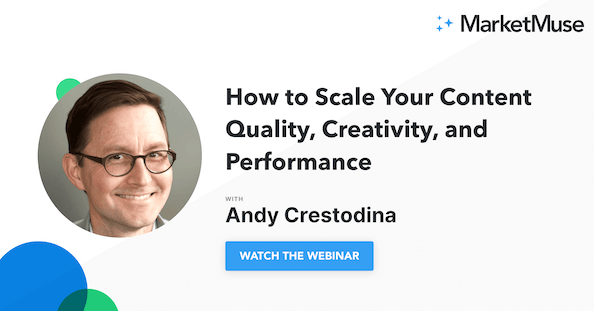Google Core Update June 2019 [Original Research Updated]
While you can never go wrong creating better content, improving the quality of your articles may not always be the answer to recovering from a Google update. In this post, we analyze the content quality of the top 20 sites that gained and lost visibility in the Google’s Core Update June 2019, as determined by Sistrix.
Content Quality and the Google Core Update
Here’s what we found.
The Google Core Update, June 2019, is called broad a broad update because it impacts many factors. Content quality doesn’t appear to be one of them, but that doesn’t mean you should stop creating the best content possible.

We observe that the content scores of both cohorts are in line with their respective competition. In other words, their content is neither remarkable nor inferior. In this update, it does not appear that quality influences any change in ratings.
Below is the data for the top 20 domains with significant increases in visibility. While some sites produce better (or worse) content than their SERP competitors, as a group the content they publish is of average quality.

Data for domains suffering notable drops in search visibility is similar to that of sites benefiting from the Google update. It indicates this group publishes content that is average with respect to their competitors.

Google March 2019 Core Update
After publishing our findings on the June update, we decided to investigate the March update as well. Here’s what we discovered.
Content scores for the top 20 winners and losers were similarly mixed. Websites with above average content didn’t necessarily fare better in this update. Same with those sites publishing below average content.
What does this mean?
It’s possible that these updates focus on similar things, but it’s not strictly about content quality. For example, these updates may be more intent focused. In that case, high quality content could still be affected if it did not match the search engine’s expectation of intent.
Content Score measures the quality of content, not its’ intent.


Background on This Study
For each of the sites mentioned in the Sistrix post, we established the top 100 keyword/URL combinations responsible for driving the most traffic during May, before the update. Each of those keyword/URL pairs were analyzed by MarketMuse to calculate their content score and that of the top 20 competitors in the SERP.
Avg. Content Score is the average of the content scores calculated for that site.
Competitive Avg. Content Score: We compare each keyword/URL to the SERP competition, assign a content score and average those.
Avg.CS/CavgCS: The content score for each URL is divided by the Competitive Avg. Content Score for that URL. This is then averaged.

What Is Content Score?
Content score is a MarketMuse metric that measures the content quality of a web page against a given topic. Specifically, it determines how comprehensively a page covers the said topic.
To do this, we first create a topic model. The MarketMuse topic modeling system is an ensemble of Bayesian probabilistic models and neural networks that are trained on hundreds of millions of web documents. This model informs us of the topics that would be included in a piece of content, were it written by an expert.
MarketMuse leverages the latest deep learning techniques to power its natural language understanding engine, enabling our platform to grasp the frequently ambiguous nuances of language.
A couple of things to note. There is no such thing as a perfect content score, which is why the score is not scaled to 100. Also, content scores are relative. You can’t compare the content score for a page on one topic against another page on a different topic.
Other Possible Factors
Although your content may be comprehensive, the experience of consuming that content may leave something to be desired. If your site has experienced a massive drop in traffic, review Google’s updated Search Quality Evaluator Guidelines(pdf).
Isolate pages that have lost traffic and review the search engine result pages (SERP) to see if there’s been a dramatic change in the SERP composition. If Google has refined their ability to determine search intent, they wouldn’t tell us, but the search results might.
At the same time, examine your backlink profile. It could be that the recent update is now catching those linking practices that used to be, at best, questionable.
Stephen leads the content strategy blog for MarketMuse, an AI-powered Content Intelligence and Strategy Platform. You can connect with him on social or his personal blog.